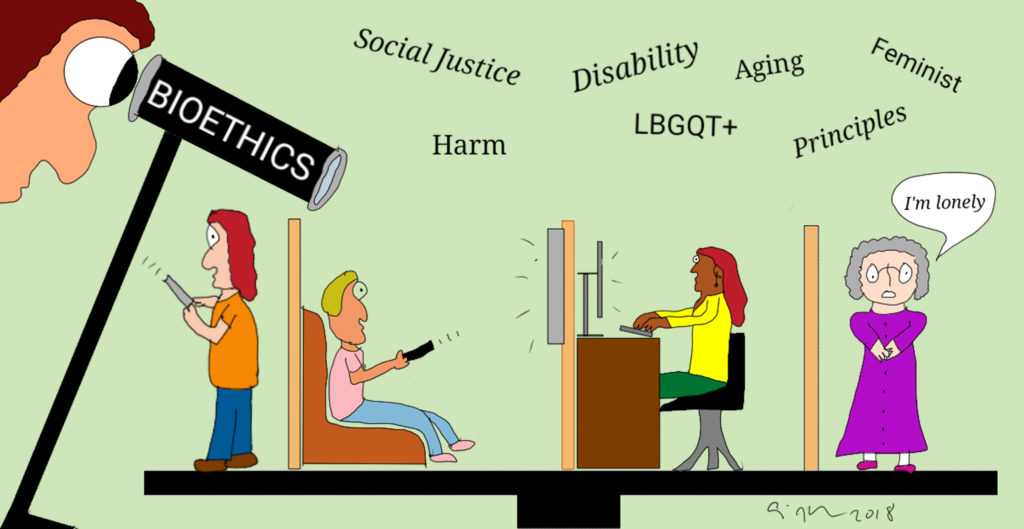by Craig Klugman, Ph.D.
Ben Sasse, Senator (R-NB) and professor of history, writes in his new book Them: Why We Hate Each Other—and How to Healthat in a world that is more interconnected through screens, we are more separate and alone than ever: “We’re literally dying of despair” he states. To prove his thesis, Sasse points to decreases in people entertaining at home, to the loss of must-see TV shows that everyone watched at the same time, to a changing workplace that has altered our sense of identity and how we relate (think telecommuting, working through computers instead of people), to the opioid epidemic (he says the last time we had radical work transformation that increased loneliness there were high rates of alcoholism), to the number of births outside of marriage, to the trend toward automatization of up to 50% of jobs, and to studies that show loneliness reduces lifespan. He suggests that we need to work on our “social infrastructure” in order to reconnect.
In some aspects, this book seems to bemoan the loss of the never-really-existed ideal of the middle class, nuclear American family: A dad who worked his entire career in an office with nice people with whom the family also socialized; high rates of marriage because there were few opportunities for women otherwise; and a world where the poor, the disenfranchised, and the disconnected were kept out of sight.
Even with these huge caveats, many experts have said that loneliness is a public health crisis. Their data relies on personal reports and decreasing traditional measures of engagement: living alone, marriage rates, number of children, attending religious services, participating in social groups, engaging in a hobby, and volunteering. A 2018 Kaiser Family Foundation/The Economistsurvey found high rates of self-reported isolation and feeling lonely throughout the U.S., U.K., and Japan. In 2010, AARP reported that 35% of people over age 45in their survey indicated being lonely.
The American Psychological Association has used this data to showthat loneliness is a health threat that we need to address, mostly based on a 2017 meta-analysis suggesting loneliness is responsible for increased “disease related mortality” rather than suicide deaths. Basically, the authors suggest that being alone increases the risk of dying. But is there causality? A 2015 study suggests that loneliness leads to functional declinein seniors and another that loneliness increases the risk of coronary heart disease.What is not clear is whether being lonely is a risk factor in itself or is a marker for other issues. For example, people may isolate because of hearing or vision impairments or because they suffer from a disease that limits their ability (or desire) to be outside the home.
What all of these publications suggest is that public health needs to find ways to re-engage people with one another, face-to-face, and away from internet-connected screens. Another interpretation is that traditional measures of engagement are no longer accurate: Maybe being part of an online gaming group that works together to solve virtual quests is effective in building togetherness. Recent studies show that gaming can be an effective to build a sense of friendship and belonging. Also, most of the studies about loneliness have focused on older populations who may be struggling more with adapting to a new world of virtual community. .
This all begs the question of what would a bioethics of loneliness look like? First, like all bioethics we would want good facts and to view them through critical perspectives. As I have attempted to introduce above, a critical feminist viewpoint may offer a description of empowering women to make their own choices. Consider my comment above that marriage rates used to be higher because there were not many other financial options for women. With more opportunities for financial independence and self support, women may be choosing to live alone, marry later, and have smaller families. Thus combatting a perceived epidemic in loneliness might actually result in reinstating restrictive social mores that repress women and reduce their choices. This viewpoint begs the question whether physical isolation and feelings of loneliness represent a choice (autonomy), a change in the modern condition (transformation), or something that has been forced upon us (harm or coercion).
A disabilities and aging lens may suggest the opposite, that alternative methods of community-building that do not depend on mobility and presentness are a boon to those who formerly met physical and other barriers to their full participation in public life. From this lens, the social transition may make things more equal. A queer perspective may suggest that online communities have enabled more people to discover their sexual orientation and gender identity in a safe place, where they could be made to feel less alone and more free to live an authentic self.
From a metaethics perspective, we may need to ask what is loneliness? How can one measure a state of being or a feeling, accurately? Most of the studies have offered self-reports of loneliness without necessarily defining it for participants. Other studies have used traditional measures of social engagement that may not represent current communities. Consider that the question of attendance at religious services is used as a marker of loneliness but going to a meet-up, participating in Reddit groups, and attending political marches are not measured.
I suggest that a bioethics of loneliness would take an interdisciplinary approach to examining what questions one should be asking, and to determining whether the change represents an exercise in autonomy or is in fact causing real harm. The fact that older measures of engagement are not met, does not mean that social engagement is at risk. We should not simply accept the headlines but rather should take a critical eye to analyzing the data, examine the change in technologies and how people interact, and then offer an informed, ethical perspective on our brave new world.